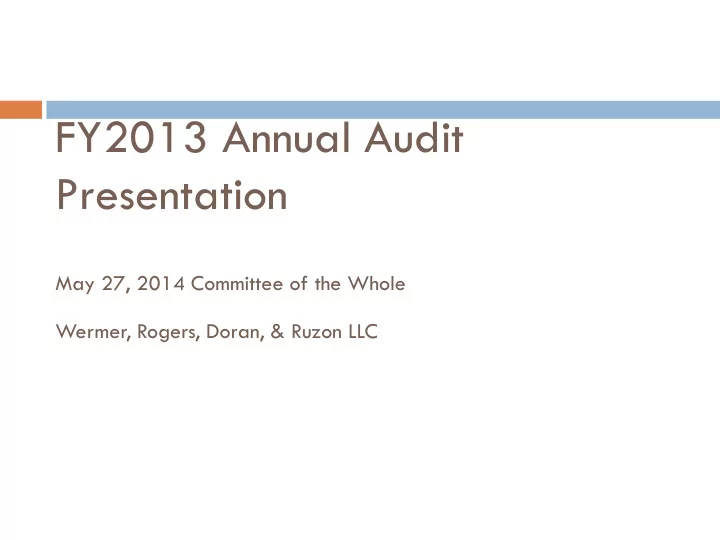

FY2013 Annual Audit Presentation May 27, 2014 Committee of the Whole Wermer, Rogers, Doran, & Ruzon LLC
Why is the County audited? Required by Illinois Statute. Resources, such as taxes, are needed to carry out many statutory duties – Sheriff, Coroner, Treasurer, etc. What has the tax money been spent on?
Audit Basics The objective of the County’s annual audit is: To form an opinion on the accuracy of the County’s financial statements in conformity with generally accepted accounting principles. To determine if the County is compliant with federal program requirements (single audit) and certain laws & regulations.
County Board’s Role Oversight of County operations, including budgeting and financial reporting.
Management’s Role vs. Auditor’s Role Financial statements are the responsibility of management (Finance Department) - NOT the auditor. Auditor’s role MUST be limited according to auditing standards (“independent”).
Finance Department Must maintain effective control over the financial reporting process. Must maintain effective control over the budgetary process.
Finance Department Responsible for development and implementation of procedures for various transactions - initiating, authorizing, recording, processing, and reporting. Responsible for maintaining the accounting records and supporting information.
Support for Accounting Transactions The County’s policies require all accounting transactions to be supported by proper documentation. Documentation depends on the type of transaction. Examples include: receipts, invoices, bank deposit slips, etc,. Auditors must review source documents (usually a sample).
Source documents should answer the following questions: Where is the money coming from (revenue) – and what fund is going to spend from? What was the money used for & why (disbursement)? Who authorized the transaction? What is the amount of the transaction? What accounting period is the transaction associated with?
Other Year-End Financial Information Accrued Receivables – What is owed to County Accrued Payables – What the County owes to others Capital Assets – valuation and reporting Long-term Debt – bonds and debt certificates Adherence to accounting standards GFOA Certificate of Achievement
Audit Procedures Review board minutes. Assess the risks of fraud. Test controls and Develop audit programs. Test transaction classes – revenues, expenditures, assets, liabilities, federal grants. Prepare draft financial statements for review by Finance, Internal Audit and Treasurer. Revise drafts, provide auditor’s report.
Recommend
More recommend